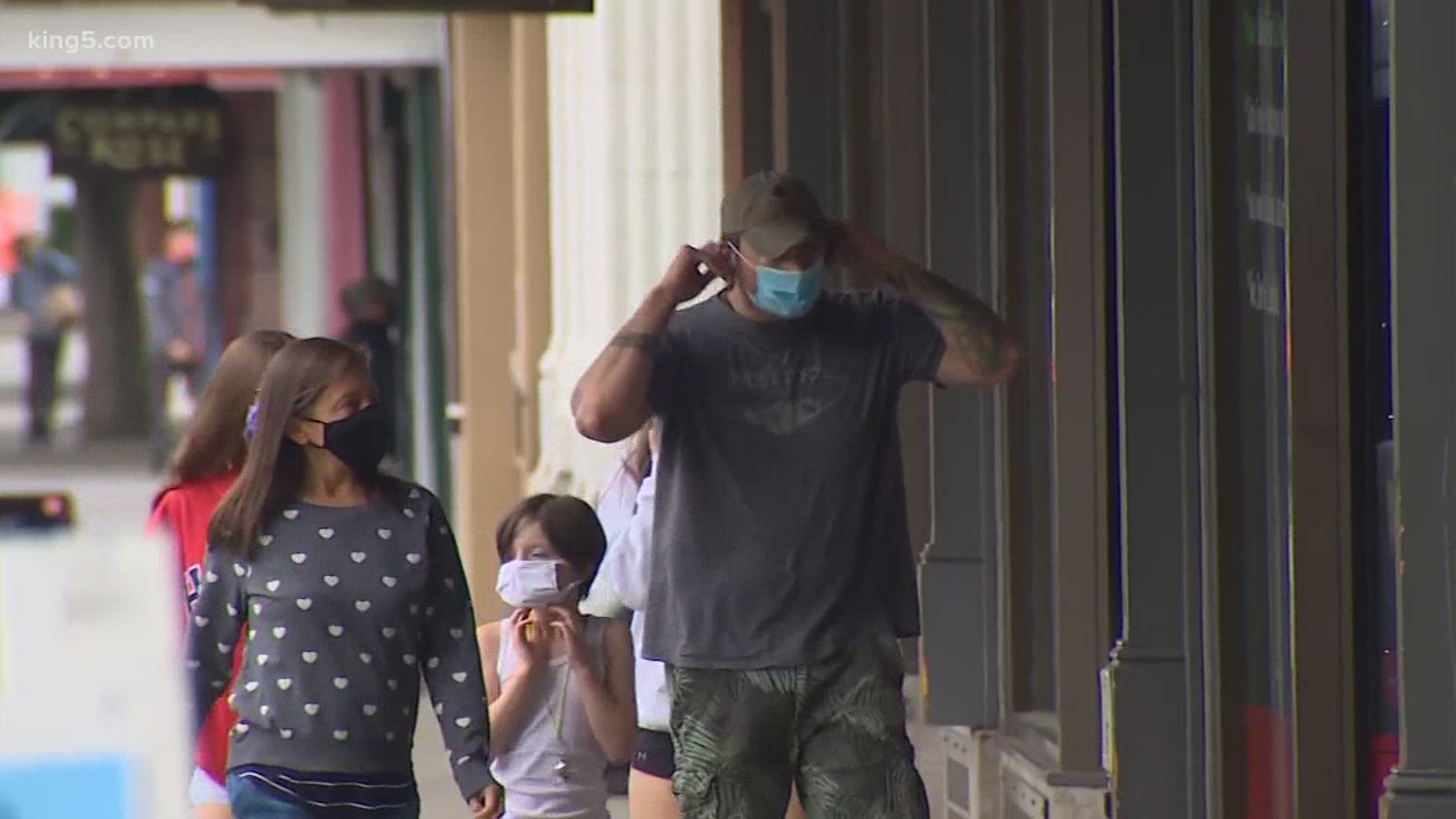SEATTLE — A study published on the Centers for Disease Control and Prevention's website is being used to support arguments against wearing masks to combat coronavirus, but a University of Washington doctor says he has concerns with the study on closer look.
KING 5's Vanessa Misciagna posted on Twitter last week about how she wears a face mask on air and someone replied with a link to video called "New CDC and WHO Study Proves 'No Evidence' Face Masks Prevent Virus." The video is by Ben Swann, a self-proclaimed journalist "speaking truth to power" and host of a show called "Reality Check."
Swann says the study – called "Nonpharmaceutical Measures for Pandemic Influenza in Nonhealthcare Settings – Personal Protective and Environmental Measures" – shows that masks are ineffective in stopping the spread of a virus. The study was published in May in the CDC's Emerging Infectious Diseases journal.
The study was done by researchers at the University of Hong Kong and was "conducted in preparation for the development of guidelines by the World Health Organization."
It looked at influenza, not COVID-19, but nonetheless, Swann used it to boost his argument that masks don't prevent the spread of a virus, like coronavirus. He used this quote from the study to back his claim:
"We did not find evidence that surgical-type face masks are effective in reducing laboratory-confirmed influenza transmission, either when worn by infected persons (source control) or by persons in the general community to reduce their susceptibility. However, as with hand hygiene, face masks might be able to reduce the transmission of other infections and therefore have value in an influenza pandemic when healthcare resources are stretched."
Swann's video has 52,788 views.
Dr. Vin Gupta, affiliate assistant professor of health metrics sciences at the Institute for Health Metrics and Evaluation at UW, weighed in on the study. He's been a resource for KING 5 on the current pandemic.
To say he had some concerns about the CDC posting this study is an understatement.
"I'm a little flabbergasted right now that this research is being published," said Gupta.
Gupta said the study is a meta-analysis, which means it's a summarization of a bunch of different studies, all of which had different ways of conducting research.
"In some cases, people reused masks, there was not a lot of standardization," he said.
While a meta-analysis can prove useful in some cases, Gupta does not believe public health policy should solely be based on a conclusion drawn from the aggregated data of a bunch of small studies.
"In cases like this that are implementation-type studies assessing the effectiveness of an intervention, you really want to make sure you have standardization," said Gupta.
The CDC has not responded to a request for comment on the study.
The study quoted by Swann says it found that surgical masks were loose-fitting and that "there is limited evidence for their effectiveness in preventing influenza virus transmission."
Gupta says that there were in fact many studies done within the last six months that prove that three-ply cloth masks or well-fitted surgical masks prevent our respiratory droplets from getting to someone else.
The key, he says, is fit. The better the mask is fit to your face, the better it is at preventing droplets from passing from person to person.
Even the study in question says that it didn't consider the use of respirators, which "are tight-fitting masks that can protect the wearer from fine particles and should provide better protection against influenza virus exposures when properly worn because of higher filtration efficiency."
"We have a burgeoning growth of high-quality research that's done in a standardized way that actually does show masks can be effective in reducing the transmission of diseases," said Gupta.
The Washington State Department of Health agrees. Spokesperson Frank Ameduri said there is ample evidence from new studies that prove masks reduce the amount of droplets that come from the mask wearer's mouth and nose.
The DOH put together a blog about the new research that came out during the pandemic about transmission and mask-wearing.
DOH says before the pandemic not a lot of research talked about the efficacy of cloth face coverings in preventing the spread of COVID-19. Now, when comparing countries who promoted face covering and those that did not (Hint: the United States), we're seeing that countries that did promote their use had fewer cases of COVID-19.
"Vietnam is a masterclass in how to handle COVID-19, in part, because they had universal masking as a feature of their society," said Gupta. "They haven't had nearly the transmission rates that we've had (in the U.S.). Let's look at the proof is in the pudding of what's lived experience."
Gupta says it's important to stay informed, do your own research and stay skeptical of claims that we can return to life as normal right now
"Anybody that is suggesting – any elected official, anybody with a megaphone right now – that we should just be going through our normal, daily life routines right now is misinformed and is trying to propagate misinformation," he said.

